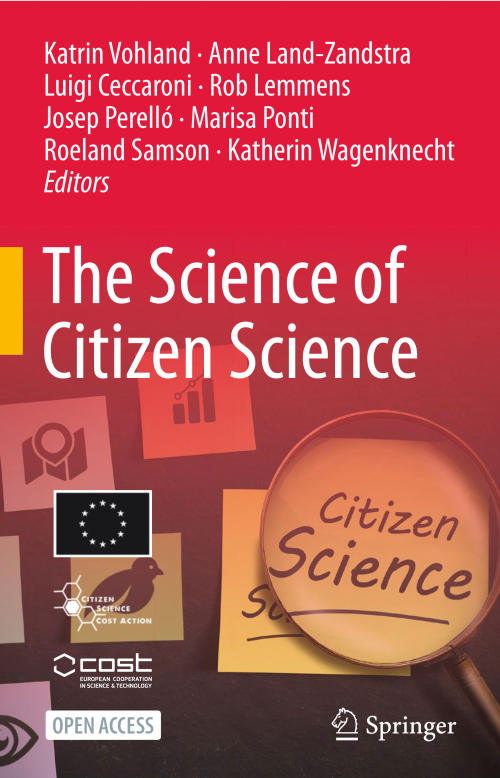Publikationen
The Science of Citizen Science
Katrin Vohland, Anne Land-Zandstra, Luigi Ceccaroni, Rob Lemmens, Josep Perelló, Marisa Ponti, Roeland Samson, Katherin Wagenknecht

Citizen science broadly refers to the active engagement of the general public in scientific research tasks. Citizen science is a growing practice in which scientists and citizens collaborate to produce new knowledge for science and society. Although citizen science has been around for centuries, the term citizen science was coined in the 1990s and has gained popularity since then. Recognition of citizen science is growing in the fields of science, policy, and education and in wider society. It is establishing itself as a field of research and a field of practice, increasing the need for overarching insights, standards, vocabulary, and guidelines.
In the process reflecting citizen science and its practices, many questions arise. How old is citizen science? What is the difference, if any, between citizen science, participatory science, post-normal science, civic science, and crowd science? Is citizen science just a new political term in order to obtain funding? Some critics view citizen science as a renewed neoliberal approach to exploit citizens by making them work for free when data is a key asset of our century. These questions may not be fully answerable, but they surely deserve considered debate. These questions are a prime example of the need to maintain a lively discourse around citizen science, with as many practitioners as possible, and then bring together in a single book all these perspectives. Therefore, the present volume aims to offer to those who are new to the field of citizen science an overview of the different aspects of citizen science and the current developments and discussions in the field. The large number of chapters is an illustration of how diverse the citizen science world is and how many different aspects need to be considered when delving into the field.
This book attempts to handle in a holistic manner all dimensions of citizen science, starting with a detailed understanding of the concepts, of science, research, and knowledge. The ambition of this book is to provide a complete picture of citizen science, including the always important ethical aspects, as well as its controversial links with commercialisation and social outcomes as well as the application of different definitions as outlined by Haklay et al. in chapter 2. Cultural differences are also at stake, as seen in the Europe-wide understanding of citizen science, described by Vohland et al. in chapter 3.
The European Citizen Science Association (ECSA) has characterised citizen science (Haklay et al. 2020) based on the ECSA 10 Principles of Citizen Science for good practice (Robinson et al. 2018). This work provided the reference to build the different chapters in this book, addressing questions of power relations, data ownership, and political impact. The book aims to contribute to the good practice of citizen science in order to develop citizen science as an acknowledged and broadly practised approach in universities, other research institutes, and civil society organisations. The scientific and epistemological benefits of citizen science for different disciplines are also addressed and critically reflected upon, mainly in the first part of the book. The second part of the book focuses on the societal impact of citizen science, with regard to policy, learning, and triggering (social) innovation. The tools and instruments that are appropriate to support and mainstream citizen science are elaborated in the third part of the book.